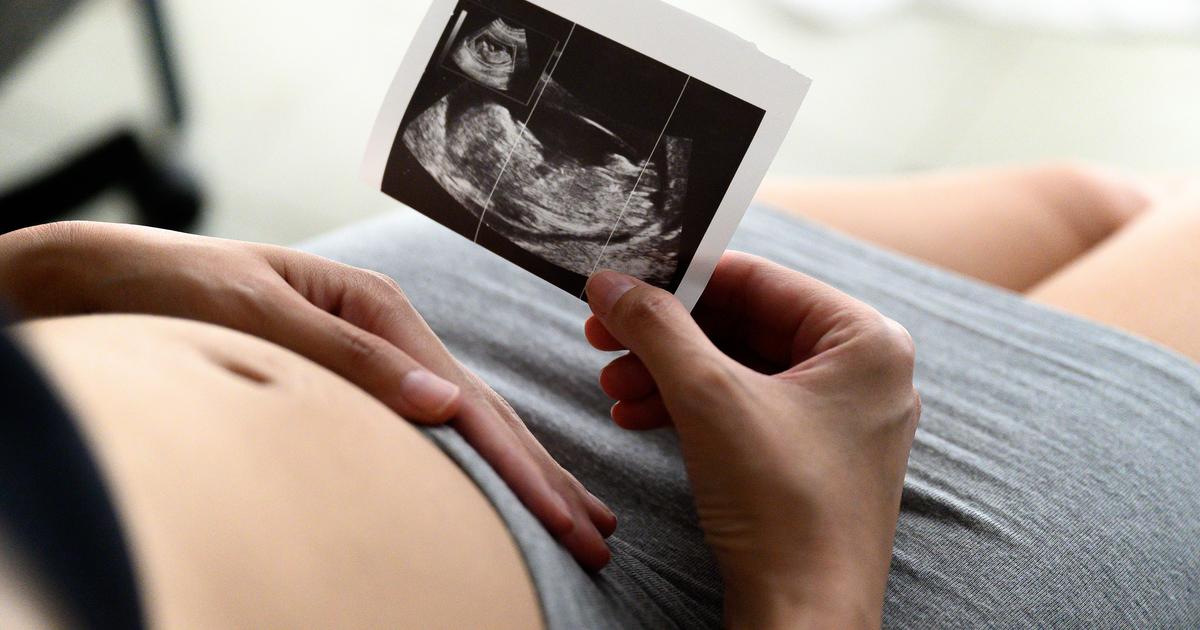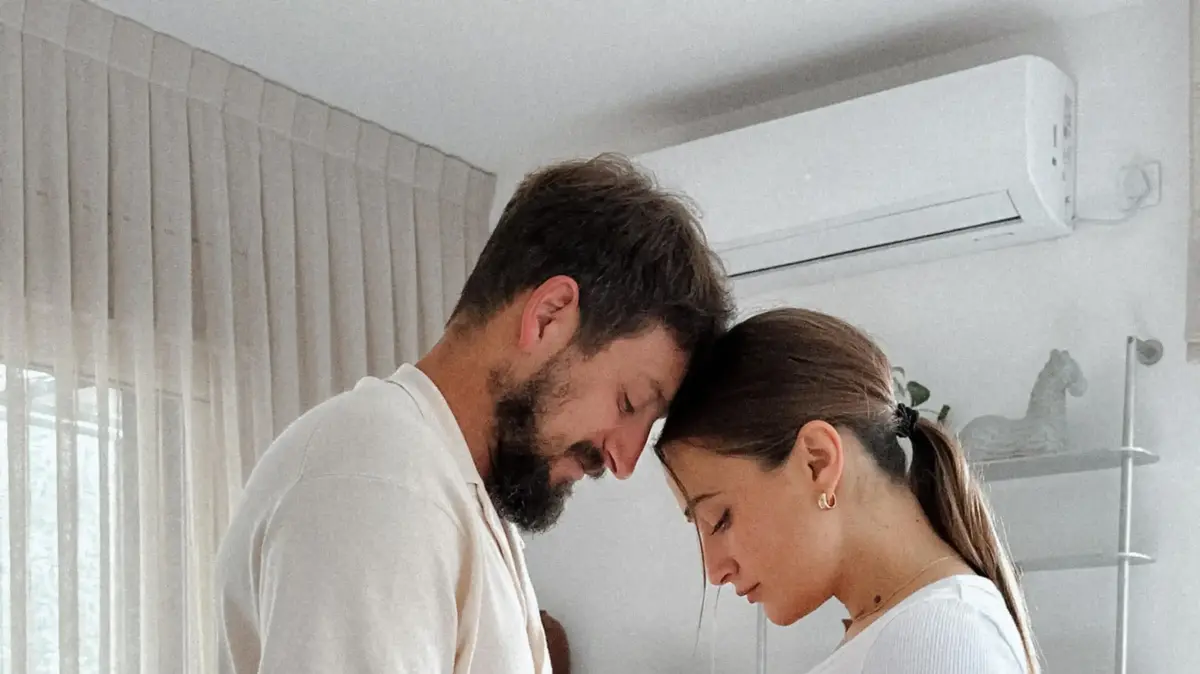A newborn, wrapped in a patterned blanket, yawns from the website of BioTexCom, the Ukrainian surrogate parenting clinic, before then crying for a bit.
"Shhh," says a nurse as she bends over the baby, rocking it back and forth in its crib.
Next to the video is a note: "Dear BioTexCom patients! Unfortunately, the level of Russia's military aggression against Ukraine exceeded all possible expectations. At the same time, we urge you to keep calm, do not panic and follow the rules of conduct. We remind you that your life and the life of your child depend on it."
The tired newborn is one of 18 babies who are currently being sheltered in a bunker of Ukraine's largest surrogacy clinic, located in a suburb of Kyiv, as they wait for their families.
Since the beginning of the Russian invasion, it has grown increasingly difficult for the future parents to pick up their children.
And every day, new children from surrogate mothers in Ukraine are being born, with hundreds more still pregnant.
Since 2015, Ukraine has developed into the global capital of surrogacy, with numerous other countries, including Nepal, India and Thailand, having banned the practice.
According to estimates, between 2,000 and 3,000 babies are born to surrogate mothers in the Eastern European country, most of them for parents abroad.
Prior to the war, the surrogacy system in Ukraine had been widely considered professional and uncomplicated.
At BioTexCom, surrogacy packages cost between 40,000 and 65,000 euros, far less than in the United States, for example, where the practice is also allowed.
Maria Holumbovska is in charge of the surrogacy clinic's business relations in Germany.
She remains in Kyiv and spoke to us about the new challenges presented by the Russian invasion.
DER SPIEGEL:
Ms. Holumbovska, your clinic is one of the largest surrogacy service providers in Ukraine and is responsible for about a quarter of the entire global market.
How many babies are currently in your care?
Holumbovska:
There are currently 18 babies in our air raid shelter in a Kyiv suburb.
But new ones are arriving every day.
We have an additional location in central Ukraine, and there are also more newborns in the maternity clinics of Kyiv.
As soon as they can be released, our chief physician picks them up in person, accompanied by representatives of a volunteer battalion.
In total, we currently have 35 babies in the country.
DER SPIEGEL:
What are conditions like in the shelter.
Holumbovska:
The suburb is still relatively quiet and you can only hear a few explosions in the distance.
There are eight nurses taking care of the babies, most of them women who have families of their own, generally in other parts of the country.
Since the beginning of the war, it has no longer been possible for them to travel home.
We are still well supplied when it comes to baby food and diapers.
We are receiving generous donations from a lot of countries.
Parents who in the past have had children with our help are also getting involved and sending aid supplies.
DER SPIEGEL:
Since the beginning of the war, some parents have managed to pick up their babies in Ukraine, such as the publicized case of a Swiss couple who flew in with a private jet.
Does the possibility currently exist for parents to pick up their babies?
Holumbovska:
Most parents want to try, despite the dangers.
Five German babies were picked up from us in the last three weeks.
We currently have three others.
The oldest German baby who is still with us was born one day before the war started.
His parents now want to pick him up. They want to drive with their own car and then travel the last portion by train.
The trip is risky, of course, and takes several days.
Once the parents arrive, they aren't able to immediately turn around and head back home.
DER SPIEGEL:
Why not?
Holumbovska:
Prior to the beginning of the war, the bureaucratic processes lasted about a month.
We have now worked out an accelerated process with the agencies so that parents can leave with their babies after just two days or so.
Fewer documents are now necessary.
But the children need a passport from the German Embassy.
And that is rather difficult at the moment.
We would like to see the German Embassy react a bit more quickly to our applications.
DER SPIEGEL:
From what countries do the children's parents come from?
Holumbovska:
We have children here from all over the world: France, the United Kingdom, Austria, Switzerland, Israel, Argentina, Brazil and China.
Our oldest children are Chinese.
Their parents are unable to leave the country and pick up their children because of the strict coronavirus measures.
DER SPIEGEL:
How are the surrogate mothers doing?
Holumbovska:
We have around 600 pregnant women in the country.
Around 80 of them are carrying children for German parents.
They come from all over the country.
We were able to evacuate all of our pregnant women from Mariupol in time.
Some women here in Kyiv are still living in their homes, while others, particularly those further along in their pregnancies, are living in our shared living quarters.
Generally, we only go out when it is absolutely necessary.
We are still able to do our shopping in the supermarkets.
When an air raid warning sounds, we head to the shelter.
It was quite shocking in the beginning, but now we have almost grown used to it.
DER SPIEGEL:
Why aren't you evacuating the pregnant women from the country?
Holumbovska:
We considered doing so at the beginning of the Russian invasion.
But we didn't think that the war would last this long.
And it seemed too dangerous to travel through Ukraine with heavily pregnant women.
What would happen if one of them went into labor in an area of fighting?
They would then have to have the baby in whatever space is available, potentially not even in a clinic.
So we came to the conclusion that it was better to stay here and wait to see what happens.
DER SPIEGEL:
Did some surrogate mothers leave the country on their own?
Holumbovska:
Yes, some of our surrogate mothers fled to Poland, but they were all women in the early stages of their pregnancy.
And they promised us that they would return to give birth.
The problem is that surrogacy is legal in Ukraine, but not in surrounding countries.
If these women give birth in Poland, then they are suddenly mothers, and the babies legally belong to them.
The bureaucratic process to change that situation would likely be extremely lengthy.
DER SPIEGEL:
What do you plan to do now?
Holumbovska:
We hope that the situation in Kyiv doesn't escalate and that we don't end up in the same situation as other cities.
We hope that the Germans finally provide us with real help.
We will continue to take care of the babies until their parents can pick them up. And we want to help many other couples to have children, many of whom have already signed a contract.
The situation is also a sad one for all of these people.
This piece is part of the Global Societies series.
The project runs for three years and is funded by the Bill & Melinda Gates Foundation.
Expand sectionWhat is the Global Societies series?
The Global Societies series involves journalists reporting in Asia, Africa, Latin America and Europe on injustices, societal challenges and sustainable development in a globalized world.
A selection of the features, analyses, photo essays, videos and podcasts, which originally appear in DER SPIEGEL's Foreign Desk section, will also appear in the Global Societies section of DER SPIEGEL International.
The project is initially scheduled to run for three years and receives financial support from the Bill & Melinda Gates Foundation.
Expand areaHow much funding are we getting?
The Bill & Melinda Gates Foundation (BMGF) is funding the project for a period of three years at a total cost of around €2.3 million.
Expand areaDoes the Bill & Melinda Gates Foundation have editorial influence?
No.
The foundation exerts no influence whatsoever on the stories and other elements that appear in the series.
Expand areaDo other media outlets have similar projects?
yes
Large European media outlets like the
Guardian
and
El País
have similar sections on their websites -- called "Global Development" and "Planeta Futuro," respectively -- that are likewise funded by the Bill & Melinda Gates Foundation.
Expand areaHas DER SPIEGEL produced similar projects in the past?
In recent years, DER SPIEGEL has completed two projects with the support of the Bill & Melinda Gates Foundation and the European Journalism Center (EJC): "Expedition BeyondTomorrow," about global sustainability goals, and the journalist refugee project "The New Arrivals," which resulted in several award-winning features.
Expand areaWhere can I find all stories and elements published as part of the Global Societies project?
All Global Societies pieces will be published in the Globale Gesellschaft section of the DER SPIEGEL website;
a selection of articles will be made available in English on the International website Global Societies.











/cloudfront-eu-central-1.images.arcpublishing.com/prisa/KMEYMJKESBAZBE4MRBAM4TGHIQ.jpg)


